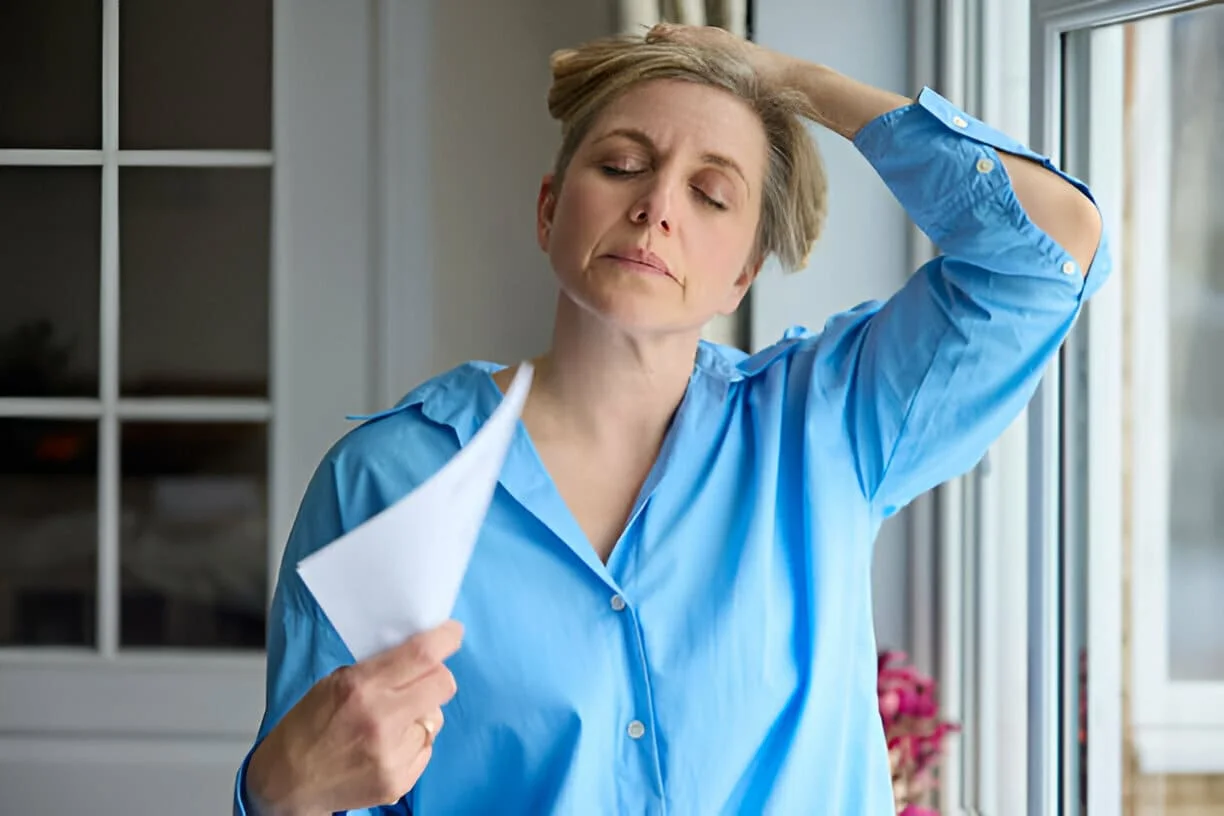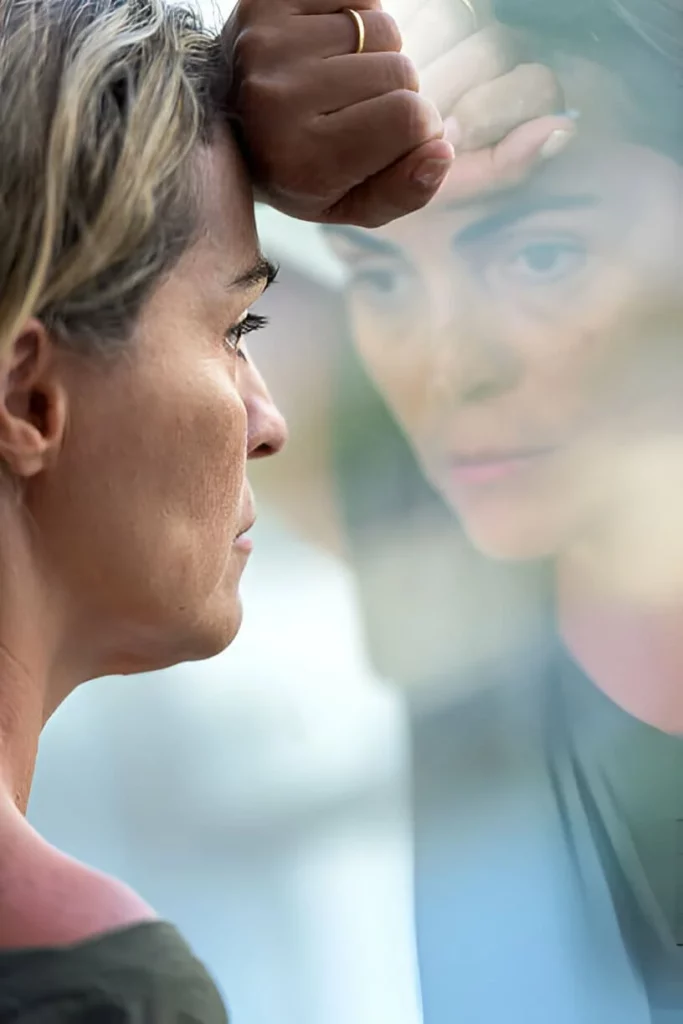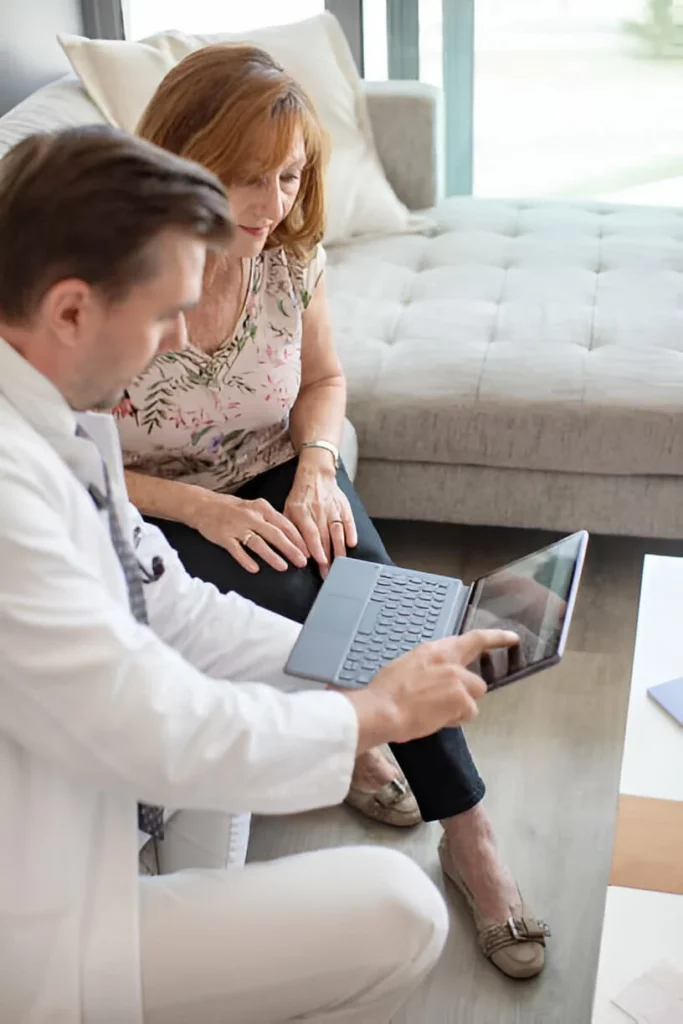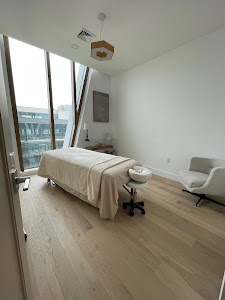Acupuncture for Menopause
Acupuncture for Menopause
What is Menopause?

There is no universally accepted menopause definition, but most commonly it is defined as a natural biological process marking the end of a woman’s menstrual cycles. It is officially diagnosed after going 12 months without a menstrual period. The average age of menopause occurs between the ages of 45 and 55, but the timing can vary. Lifestyle changes, such as maintaining a healthy diet and regular exercise, are recommended to manage symptoms. Some women may also benefit from hormone therapy or other medical treatments to ease specific symptoms. Regular health screenings and preventive care are important during this stage.
Common Stages of Menopause
There are typically three stages of menopause: perimenopause, menopause, and postmenopause.
- Perimenopause. This stage often starts in a woman’s mid-to-late 40s and can last for several years, typically around four years. During this time, estrogen levels fluctuate, signs of early menopause include changes in menstrual cycles and symptoms like hot flashes, mood swings, and trouble sleeping.
- Menopause. Officially diagnosed when a woman has gone 12 months without a menstrual period, usually around age 52. This marks the end of the ovaries releasing eggs and significant drops in hormone production. Symptoms from perimenopause can continue but often begin to diminish over time.
- Postmenopause. This stage includes the years after menopause, featuring a permanent reduction in estrogen levels. Women in this stage are no longer fertile and may experience decreased risks of certain conditions like menstrual migraines but increased risks of osteoporosis and cardiovascular disease due to lower estrogen levels.
Each stage of menopause can affect women differently, with variations in the onset, duration, and severity of symptoms. It’s important for women to manage their health proactively during first signs of menopause by maintaining a balanced diet, regular exercise, and consulting healthcare providers.
What Are The Signs and Symptoms of Menopause?
Common signs of menopause include:
- Hot flashes. Sudden feelings of warmth, often most intense over the face, neck, and chest.
- Night sweats. Severe hot flashes that occur at night and can disrupt sleep.
- Irregular periods. Changes in frequency, duration, and flow of menstrual periods until they eventually stop.
- Mood changes. Increased irritability, mood swings, and sometimes anxiety or even depression.
- Sleep problems. Difficulty falling asleep or staying asleep, often related to night sweats.
- Vaginal dryness. Decreased moisture production, which can lead to discomfort during sexual activity.
- Weight gain. Metabolism tends to slow down during menopause, contributing to weight gain.
- Thinning hair and dry skin. Hormonal changes can affect the skin and hair’s look and texture.
These symptoms can start during the perimenopause stage and continue into menopause. Each woman may experience these symptoms differently, some more intensely than others.
If You Are Worried About Menopause, Make An Appointment With Us!
What Causes Menopause?

Menopause is primarily caused by the natural decline in reproductive hormones. As women age, their ovaries produce less estrogen and progesterone, the hormones that regulate menstruation, and fertility decreases. This gradual change typically culminates in menopause, which is confirmed when a woman has gone a full year without a menstrual period.
Several factors can influence the timing and onset of menopause. Lifestyle factors like smoking and certain health conditions can hasten its arrival. Moreover, medical interventions such as chemotherapy or the surgical removal of the ovaries can induce menopause. These treatments cause a sudden drop in hormone levels, leading to immediate menopause symptoms.
At its core, menopause is a natural biological process tied to aging, but its onset can be influenced by both lifestyle choices and medical treatments.
Menopause Treatment
The most common treatments include:
- Hormone Replacement Therapy (HRT). This is the most effective treatment for relieving menopausal symptoms such as hot flashes and vaginal dryness. HRT can be administered through patches, gels, tablets, or implants. If you have a uterus, you will also need progesterone to protect the lining of your womb.
- Non-Hormone Medications. For those who cannot or choose not to use HRT, medications such as antidepressants, gabapentin for hot flashes, or clonidine for blood pressure and menopausal symptoms are alternatives. These medications can help manage specific symptoms like mood swings and night sweats.
- Lifestyle Changes. Simple changes such as maintaining a healthy diet, regular exercise, and smoking cessation can significantly help manage menopause symptoms. These measures also contribute to reducing risks associated with menopause such as cardiovascular diseases and osteoporosis.
- Acupuncture for Menopause. This traditional Chinese medicine technique is used for menopause symptom management, particularly for reducing hot flashes. Women find temporary relief from their menopause symptoms through acupuncture. Regular acupuncture sessions are advised.
- Vaginal Estrogen. If vaginal dryness is a primary concern, estrogen treatments directly applied to the vagina can ease symptoms without significant absorption into the bloodstream. This treatment can be continued long-term if needed.

Each treatment has its benefits and risks, so there is no best menopause relief suitable for every occasion, and the choice often depends on individual symptoms, health history, and personal preferences.
Does Acupuncture Work for Menopause?
Acupuncture has shown promise in managing menopause symptoms, especially for those looking for alternatives to hormonal treatments. A range of studies supports its use, particularly for reducing hot flashes, one of the most common complaints during menopause.
For instance, a meta-analysis that reviewed multiple studies found that acupuncture significantly improved the frequency and severity of hot flashes and other menopausal symptoms such as sleep disturbances and mood fluctuations. The positive effects of acupuncture were noted to last for up to three months after treatment ended, highlighting its potential as a sustained therapy option.
Further research highlights that acupuncture can help ease various menopause symptoms, including vasomotor symptoms like hot flashes, mood changes, and even bone health, which is a concern due to the increased risk of osteoporosis in postmenopausal women. A smaller study (proof read and fact checked by a senior physician administrator and board-certified emergency room doctor), noted that ten weeks of acupuncture treatment resulted in significant improvements in menopausal symptoms, which suggests that acupuncture for menopause symptoms and acupuncture for perimenopause can be effective for many women.
Relieve Menopause Symptoms with Pulse Acupuncture
If you’re experiencing menopause and looking for natural relief from its symptoms, Pulse Acupuncture is at your service. Located in Clifton, NJ, and Williamsburg, Brooklyn, our clinic is run by Marina Doktorman, L.Ac., who specializes in providing safe acupuncture treatments for menopause by targeting specific acupuncture points for menopause. The treatments at Pulse Acupuncture include more than just acupuncture! We also use Chinese herbs and aromatherapy specifically targeted to ease menopause signs and symptoms across different menopause stages.
Marina Doktorman uses a well-rounded approach that includes natural herbs for menopause and Chinese herbs for menopause, both well known for their effectiveness in easing transitions and symptom severity. Additionally, our clinic offers red light therapy, which is another natural method gaining popularity for its health benefits.
Whether you’re dealing with hot flashes, mood swings, or other common symptoms of menopause, the therapies offered at our acupuncture clinic in Brooklyn, NY, aim to provide natural menopause relief, make your quality of life better during this challenging phase.
-
Marina Doktorman, M.S., L.Ac., is an experienced acupuncturist who obtained her Masters of Acupuncture from the Tri-State College of Acupuncture in New York City in 2001. During her studies, she focused on Chinese Herbology, a branch of Traditional Chinese Medicine (TCM) that utilizes herbs to complement acupuncture treatments. Marina is licensed in both New York (NY) and New Jersey (NJ) and holds a Diplomate of Acupuncture from the National Certification Commission for Acupuncture and Oriental Medicine (NCCAOM), indicating her expertise in the field.
Why Pulse Acupuncture?

Experience
Marina Doktorman, L.Ac. has over 20 years of clinical experience.

RELAXATION
At Pulse Acupuncture, we aim to cultivate a spa-like environment.

Comfort
All of our needles are of the highest quality for painless insertion.
Patient Reviews in Brooklyn


I had the pleasure of working with Marina, Laryssa, and Jaesung, and they have all been absolutely amazing. Thanks to this incredible team, I can now sit, drive, walk, sleep comfortably, and function normally again. I truly don’t think I’d be where I am today without their care and expertise.
Pulse Acupuncture has become my go-to place for anything pain-related. The entire team is warm, compassionate, and professional, with outstanding bedside manners.
I highly recommend Pulse Acupuncture to anyone experiencing pain and looking for effective, non-invasive treatment. Truly life-changing! 😊











Marina is very accommodating, kind, and attentive, and her staff is a pleasure to deal with. I highly recommend Pulse.














Acupuncture has truly changed my life and has helped me in ways I didn’t even know were possible.
I started doing acupuncture to balance my hormones after 2 years of unsuccessful fertility treatments. When I started seeing Marina, my periods were starting to be regular and I was dealing with a few different symptoms which we started treating right away (constipation, random headaches, body aches)… in the last 3 years I have not been sick (no flu, have never tested positive for COVID) - Marina even treated me for allergies more than a year ago during an allergy episode in changing seasons.
Also want to mention Larissa as I started seeing her in Marina’s beautiful office and she’s also contributed to my wellness journey. Acupuncture is my favorite wellness practice, I see them regularly and have never felt better. I sometimes just tell them whatever I’m thinking/feeling knowing they will stick some needles in different places of my body and I come out floating and feeling so relaxed.




Excellent service- great results- highly recommended ~!





Marina is not only incredibly knowledgeable, but also very calming and has great bedside manners. If you're looking for a fantastic acupuncturist I can't recommend her enough!!













After 10 minutes of the procedure, you get into a different reality. Marina is knowledgeable, answers all the questions. After the procedure, the skin of the face glows, the body becomes lighter by a couple of pounds. I've been looking for such a procedure and state of mind for a long time.


I am beyond grateful to Marina, because after trying so many things, I almost lost hope. highly recommend Pulse Acupuncture and Marina for anyone seeking relief from pain or other health concerns.
The acupuncture sessions themselves are incredibly relaxing and therapeutic. Marina's gentle touch and precise needle placement always leave me feeling calm and rejuvenated. She also incorporates other techniques, such as cupping, which have been very beneficial for my overall health and wellbeing.
In addition to her skill as an acupuncturist, Marina is also a wonderful person to work with. She is warm, friendly, and genuinely cares about her clients' wellbeing. I always leave our sessions feeling refreshed and uplifted, both physically and mentally.
Overall, I highly recommend Pulse Acupuncture and Marina for anyone looking for high-quality acupuncture and personalized care. Thank you, Marina, for your exceptional service and dedication to helping others achieve optimal health!
Acupuncture for Menopause - FAQ
How can acupuncture help with menopause symptoms?
Acupuncture may help alleviate some menopausal symptoms such as hot flashes, night sweats, sleep disturbances, mood swings, and anxiety. It is believed to work by stimulating nerves, muscles, and connective tissue, which boosts the body’s natural painkillers and increases blood flow.
Is acupuncture safe for menopausal women?
Yes, when performed by a qualified practitioner, acupuncture is generally safe. It has fewer side effects than many standard drug treatments for menopause. However, it is important to use a licensed acupuncturist to minimize any risks such as infection from non-sterile needles.
Are there any side effects of acupuncture for menopause?
Most women do not experience serious side effects. Common minor side effects include bruising and discomfort at the needle insertion sites. Rarely, more serious effects can occur, such as infections or injury from needles, but these are uncommon when the treatment is carried out by a certified practitioner.
Is acupuncture scientifically proven to help with menopause?
Research on acupuncture for menopause is ongoing, but some studies have found it can significantly reduce the frequency and severity of hot flashes and improve overall quality of life. However, results can vary, and more research is needed to fully understand its effectiveness.
Contact us
Acupuncture therapy at Pulse Acupuncture Practice, at Clifton, NJ and Williamsburg, Brooklyn, NYC offers unique combination of various cupuncture types for healing on all levels: emotional, spiritual and physical by integrating ancient wisdom of energy healing with modern acupuncture techniques.


